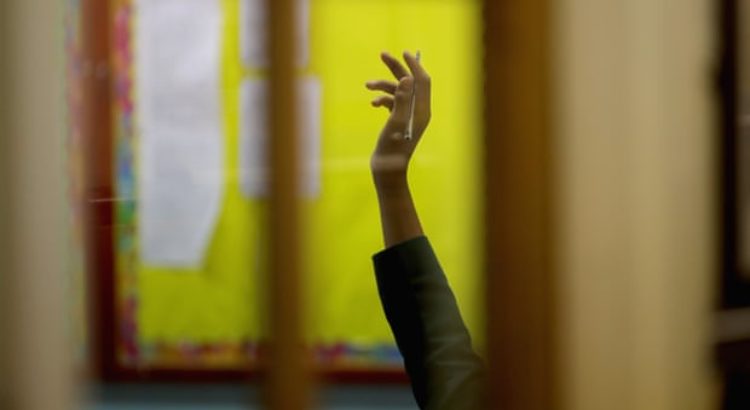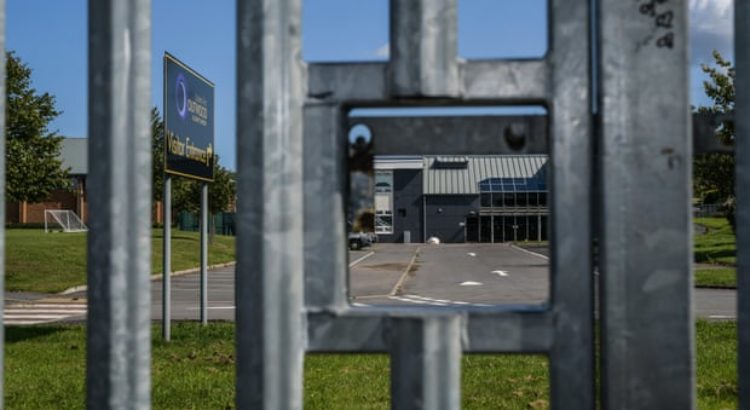By Frances Perraudin
Parents attack ‘consequence rooms’ where pupils are made to sit alone in silence for hours
Parents have criticised the use of isolation booths at secondary schools across the country, after concerns were raised about the “zero-tolerance” behaviour policies run by some academy trusts.
Guardian analysis found this week that 45 schools in England excluded at least 20% of their pupils in the last academic year. The Outwood Grange Academies Trust – which runs 30 schools across Yorkshire, the Humber and the east Midlands – ran nine out of the 45.
Outwood Academy Ormesby in Middlesbrough topped the list, with 41% of its pupils receiving at least one suspension in the last academic year.
Parents with children at schools in the trust raised concerns that, as well as the high levels of exclusions, many schools were also using “consequences rooms” – small booths in which a child sits alone and in silence for hours on end as punishment for breaking school rules.
The booths have been described as “internal exclusions” and parents called on academy trusts to release information on the number of hours of education children were missing while in the booths.
According to Outwood Grange Academies Trust’s behaviour policy, “the rule when in detention and in the consequences room is occupy and ignore”.
“Students cannot sleep or put their heads on the desk. They must sit up and face forward,” it adds.
When in the booths, children are not allowed to “tap, chew, swing on their chairs, shout out, sigh, or any other unacceptable or disruptive behaviour”.
“You will be allowed to go to the toilet up to a maximum of three times during the day (maximum five minutes per visit),” the policy reads. “You must use the closest toilet and go directly there and back. You will be escorted to get your lunch, but you must stay silent.”
Pupils may complete work they have brought themselves but they do not have to.
One mother, whose son goes to an Outwood Grange school in Wakefield, said her son had lost days of his education sitting in a consequence room. “It’s a small booth. They can’t look left or right, they can’t look behind. They have to focus in front all the time. They can’t speak to anyone for the whole day. It’s basically an internal exclusion. It’s barbaric,” she said.
Another mother, whose son goes to a school in Yorkshire run by the DeltaAcademies Trust, said he was “just a regular kid” and there had never been serious concerns raised about his behaviour before the school’s new discipline policy was introduced.
“Then he got 22 hours in an isolation booth in one week and he was just an absolute mess,” she said. “He came out at the end of the day and he didn’t look well. His legs were shaking and he could hardly string a sentence together. He looked completely done in.
“My concern is they’re not using other methods that actually keep the children in the classroom. Eight hours is far too long to keep a child in isolation. I don’t think they want to put the resources into other ways of dealing with behaviour. They are multi-academy trusts and I think they want to try and keep costs down.”
In March, delegates at the National Education Union conference in Brighton voted unanimously to oppose “the move towards ever more punitive behaviour policies in schools”, saying it was feeding a mental health crisis for children.
The motion read: “The increasing use of detention, isolation and exclusion, often talked of as being ‘zero -tolerance’ approaches, usually mean ignoring the varied difficulties children have, in favour of punishment. We believe that, above all else, children need support, respect and love.”
A spokesperson for the Outwood Grange Academies Trust said: “The use of isolation booths and rooms allow students to calm down, reflect and often self-correct their behaviour that may have led to that situation.
“The trust employs all reasonable adjustments for students with special needs within their behaviour policy and invest in the pastoral and welfare support of all our students.”
The trust added: “Ofsted have inspected our academies using this behaviour policy for the past 15 years and in every case found the academy to have transformed the education that students receive, with five being rated ‘outstanding’.”
Like Outwood Grange, the Delta Academies Trust, which runs 46 schools across the country, said pupils were given a number of warnings before being put in isolation and that wraparound support was provided for them.
“It is not unusual in secondary schools for students to have periods of time in isolation as a result of persistent defiance and disruptive behaviour,” said a spokesperson.
“This is the case in both local authority schools and academies and is an effective measure to reduce low-level disruption and truculent behaviour, which is widely reported as having a deleterious effect on the quality of education in our country. Obviously students who are in isolation will complain they don’t like it; that is because it is a punishment for disrupting other children’s education.”
A Department for Education spokesperson said: “It is up to schools to decide what forms of discipline they adopt, as long as they are lawful and used reasonably. If a school chooses to use isolation rooms, pupils’ time in isolation should be no longer than necessary and used as constructively as possible.”
Source of the article: https://www.theguardian.com/education/2018/sep/02/barbaric-school-punishment-of-consequence-rooms-criticised-by-parents







 Users Today : 40
Users Today : 40 Total Users : 35460303
Total Users : 35460303 Views Today : 59
Views Today : 59 Total views : 3419027
Total views : 3419027